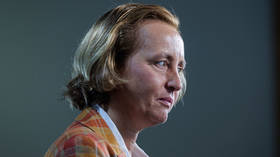Germany’s opposition party leader hospitalized after alleged attack
AfD’s Tino Chrupalla collapsed after taking selfies at an event following what the German political party called an “assault incident”
Tino Chrupalla, the co-chair of the right-wing Alternative for Germany (AfD) party, was hospitalized on Wednesday after collapsing at a campaign event in Ingolstadt, the party’s national website reported. While the details of the incident have not been officially made public, the party hinted at an “assault incident” precipitating his collapse.
Sources exclusively told RT.de that the politician was attacked using a syringe containing an unknown liquid that caused anaphylactic shock. Police reportedly told Austrian journalist Gerald Grosz, who was also listed to speak at the rally, that Chrupalla had collapsed after taking selfies with members of the public.
The Upper Bavaria North Police Headquarters announced on Wednesday evening that Chrupalla was found to have had no apparent injury at the hospital, according to German news outlet Focus, though other outlets have indicated that his situation is “still being clarified.” The Ingolstadt Criminal Investigation Department is reportedly looking into the incident, and police have asked any attendees who took photos or videos in the area to submit them online via a special upload portal.
Chrupalla’s AfD co-chair, Alice Weidel, had canceled a Unity Day appearance in Bavaria-Thuringia on Tuesday for security reasons following a threat of attack to her second home in Switzerland that required the relocation of her family with a security escort.
AfD members and their families frequently require personal protection due to violent threats, physical attacks, and vandalism, according to German media outlets – Chrupalla himself has been attacked before – but party representative Stephan Brandner told NZZ that a threat requiring the relocation of a politician and her entire family to a safe house was unprecedented in post-war Germany.
The party’s defense policy spokesman, Rudiger Lucassen, warned the outlet that the “heated political climate” in which AfD was routinely demonized by other parties could easily produce “an attack with fatal consequences against one of our members.”
While the AfD has grown in popularity among the German electorate to the point that it plans to nominate its own candidate for chancellor for the first time in 2025, victory would require one or more coalition partners to run the federal government. Germany’s other parties have thus far refused to work with the right-wing populists, who are often denounced as extremist bogeymen by the media.
The AfD’s youth wing was designated an extremist organization by the German federal government earlier this year, subjecting its members to covert surveillance and onerous legal hurdles for employment and weapons licenses. The party has been illegally shut out of the two main public news channels and was labeled a suspected threat to democracy last year, while some in party leadership worry that despite – or perhaps because of – its increasing popularity, attempts may soon be made to ban it from politics entirely.
Founded in 2013, AfD is known for its tough stance on migration, LGBTQ rights, and EU bureaucracy. The party has surged in popularity in recent years, polling second after former Chancellor Angela Merkel’s Christian Democratic Union.





Comments are closed.